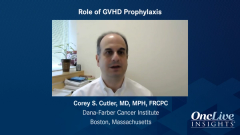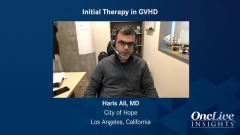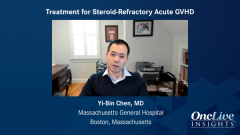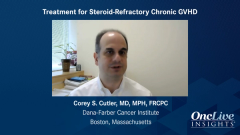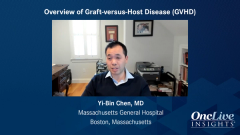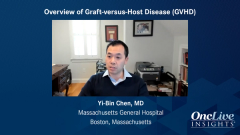
Emerging Therapies for Acute and Chronic GVHD
Novel agents in the pipeline for the treatment of acute and chronic GVHD are discussed.
Episodes in this series
Corey S. Cutler, MD, MPH, FRCPC: There are several emerging therapies in acute GVHD [graft-vs-host-disease]. We are actively testing the Equillium, Inc compound EQ001, a nondepleting anti-CD6 antibody, which prevents T-cell activation and T-cell migration. We’re testing that as initial therapy for acute GVHD. The Blood and Marrow Transplant Clinical Trials Network is actively testing alpha-1 antitrypsin, which is an anti-inflammatory acting at the level of the polymorphonuclear cell in acute GVHD. There is also a trial of a double antibody conjugate, an anti-CD3, anti-CD7, both of which are conjugated to ricin. That is also being carefully tested in acute GVHD through the Blood and Marrow Transplant Clinical Trials Network. There are lots of drugs that are being tested. I firmly believe that the proper way to deal with acute GVHD is to improve our prophylactic strategies. When we look at the results of the newest costimulatory blockade trials, such as ABA3, the Fate Therapeutics trial, which is looking at graft manipulation strategies, the vedolizumab trial, which is looking at ways of preventing T-cell trafficking to organs such as the gut, all of these strategies are likely to be more fruitful than therapy of acute GVHD. This is really when prevention becomes far better than treatment of active disease.
Haris Ali, MD: There are a number of other drugs that are being actively studied for treatment of chronic GVHD. One is itacitinib, which is a selective JAK1 inhibitor. It is being used as upfront treatment for chronic GVHD. There is another drug developed by Kadmon Holdings, Inc, KD025 [belumosudil], that appears to be effective in patients who have failed multiple lines of therapy. We have a trial open for another agent called leflunomide for treatment of chronic GVHD. There are multiple combinations of various different modalities, including IL-2 [interleukin-2], ECP [extracorporeal photopheresis], and a JAK inhibitor for treatment of upfront and steroid-refractory chronic GVHD.
Transcript Edited for Clarity



